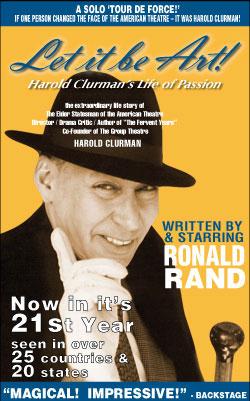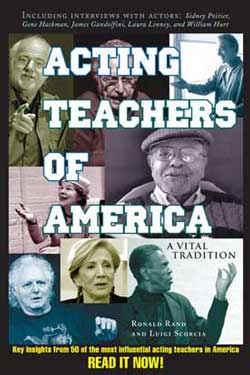Marty Raybon
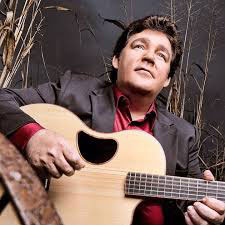 An acclaimed American country music artist, Mr. Raybon is the lead singer of the band, “Shenandoah.” Co-founder of the band in 1985, he was with “Shenandoah” until 1997. He rejoined the band in 2014, along with Mike McGuire, Stan Munsey and Chris Lucas. The band released a recent album: “Good News Travels Fast” Mr. Raybon is the voice of such classic country hits as "The Church on Cumberland Road,” “Next to You Next to Me,” “Somewhere in the Vicinity of the Heart,” “Two Dozen Roses”, “I Want to be Loved Like That,” Ghost in This House,” “I Want to Be Loved Like That”, “Rock My Baby,” “If Bubba Can Dance (I Can Too)”, written by Mr. Raybon and Mr. McGuire, “Her Leavin’s Been a Long Time Comin,” and the Grammy-winning “Somewhere in the Vicinity of the Heart” duet with Alison Krauss. “Shenandoah” recorded nine studio albums and had twenty-six singles on Billboard’s Hot Country Songs chart. He recorded his first solo album, “Marty Raybon,” in 1995. Before leaving Shenandoah in 1997, he and his brother Tim formed a duo known as the Raybon Brothers, which had culminated that year with the hit single, “Butterfly Kisses.” Mr. Raybon’s second self-titled album was released in 2000, followed by “Full Circle,” “When the Sand Runs Out.” Mr. Raybon is an ordained minister and serves as guest speaker at churches around the country. Mr. Raybon released the Country Christian album, “Hand to the Plow,” with the celebrated single, “I’ve Seen What He Can Do” produced by Mark Carman.
An acclaimed American country music artist, Mr. Raybon is the lead singer of the band, “Shenandoah.” Co-founder of the band in 1985, he was with “Shenandoah” until 1997. He rejoined the band in 2014, along with Mike McGuire, Stan Munsey and Chris Lucas. The band released a recent album: “Good News Travels Fast” Mr. Raybon is the voice of such classic country hits as "The Church on Cumberland Road,” “Next to You Next to Me,” “Somewhere in the Vicinity of the Heart,” “Two Dozen Roses”, “I Want to be Loved Like That,” Ghost in This House,” “I Want to Be Loved Like That”, “Rock My Baby,” “If Bubba Can Dance (I Can Too)”, written by Mr. Raybon and Mr. McGuire, “Her Leavin’s Been a Long Time Comin,” and the Grammy-winning “Somewhere in the Vicinity of the Heart” duet with Alison Krauss. “Shenandoah” recorded nine studio albums and had twenty-six singles on Billboard’s Hot Country Songs chart. He recorded his first solo album, “Marty Raybon,” in 1995. Before leaving Shenandoah in 1997, he and his brother Tim formed a duo known as the Raybon Brothers, which had culminated that year with the hit single, “Butterfly Kisses.” Mr. Raybon’s second self-titled album was released in 2000, followed by “Full Circle,” “When the Sand Runs Out.” Mr. Raybon is an ordained minister and serves as guest speaker at churches around the country. Mr. Raybon released the Country Christian album, “Hand to the Plow,” with the celebrated single, “I’ve Seen What He Can Do” produced by Mark Carman.
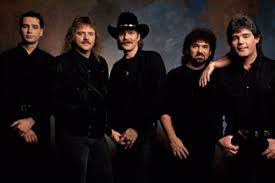
Shenandoah in the 1980s
It looks like its turned into a very creative time in your life, with “Shenandoah’s” exciting album, “Good News Travels Fast,” plus all of your touring.
It’s really an expansion of what’s been going on for thirty years. You know, I’m a believer; I don’t believe in luck, happenstance. I believe in the province of God. “Good News Travels Fast” is a season, you might say, in our career to where we're going as a whole. Everyone in the group is terrific, Mike McGuire, Stan Munsey and Chris Lucas, and Jay is tremendous producer. He can hear “cigarette smoke” on a record. He wants to hear the music the way he wants hears it.
And September marks “Shenandoah’s” thirtieth year anniversary since we began in 1987. It will literally be thirty years since “Shenandoah” came out with our first single; that’s the reason the album’s going to be released then.
Was music a part of your life growing up?
It always has been. I remember being in my third grade talent show. I sang Johnny Horton’s song, “The Battle of New Orleans,” which my Dad taught me, it’s the one I felt most comfortable doing, and I knew all the words.

Growing up, we were poor, but my mother made sure for the talent show that I had a pair of black slacks, a white short and a bow tie, and we didn’t have money for ties. My mother was a very loving and compassionate other, but as I said, I kept pulling at that tie.
When I got up there to the platform my mother told me: “Don’t take off the tie,” several times to me; I was tempted. I don’t know how well I sang but the one thing that came out of it — as I walked to the microphone and while I was singing, I felt something inside. I was only eight years old but I knew I was going to do this the rest of my life.
On the way home I told her: “Mom, I‘m going to do this rest of my life.” She said: “Son, you looked nice.”
Even at that time it meant something to me. Maybe my mother didn't get it was perhaps I don’t have a really good way of explaining things. I love people, I truly do but I’m also so worried I might offend them; I just pray I say it right.
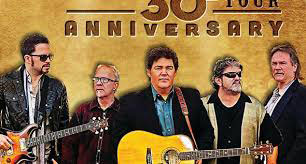
Shenandoah on tour in 2017
Were there singers you listened to growing up that had an impact on your style?
Growing up I loved listening to Ralph Stanley and the Clinch Mountain Boys. My brother and I were tremendous fans of the Osbourne Brothers, they sang “Rocky Top,” and Jim and Jesse McReynolds, and The Lubin Brothers, they were all brother acts, so that’s what drew my brother and I to them.
We loved their honest and relaxful way of singing — they were just naturals, they didn’t take lessons, they just sang from their hearts. It’s what they saw when you hear George Jones sing or you’d listen to Merle Haggard.
I like listening to the old vinyl records; its like hearing “the bacon frying” from the needle, there’s a warm sound that comes. I’m an extremely big fan of Harry Connick, Jr., Sinatra, Johnny Mathis, Ben Vereen, Perry Como. I love some of the stuff of The Beatles, Coldplay, Clarence Carter, Aretha Franklin. When I hear great music I put it on my phone so I can listen to it.
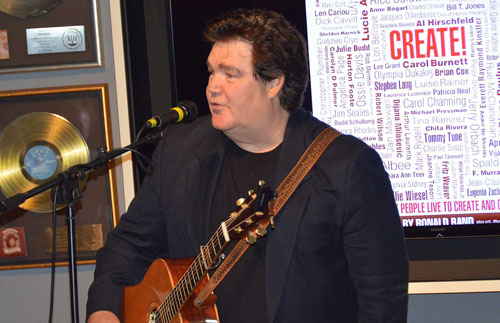
performing at CREATE! book event at Alabama Music Hall of Fame, Tuscumbia, Alabama -
photo by Mary Carton
How did you develop your skill in phrasing the songs you’ve sung?
That was another process of learning. I never had a lesson nor did my brothers. I was a big fan of Jimmy Martin and The Mountain Boys, and he had tremendous timing. His band played in a hard driving sound that really was something when you heard it. Whether it’s in singing like Ralph Stanley or Sinatra, I think when a singer’s being doing it long enough, they accumulate a way of melding yourself with the score: I think any great singer does it naturally, and it becomes a part of you. You pick up little nuggets along the way from listening to this performer or that one as you try and perfect a sound. Nobody sings like God, therefore what comes, comes from people who influence you.
The way you sing the song, “Daddy Phone” is extremely moving. You’ve said that it’s a true story.
David Masterdom wrote that. It’s actually a true story. His brother had divorced, it was all complicated as they can be. The kids — they’re the ones who truly lose, and he gave his son a phone telling him: “You can call your daddy on the cell phone, and programmed his number in. Telling him: I’m here.” It’s a real life study.
But I still feel videos can be limiting because if you have a two minute and fifty-second song, you’ve got the short but of time to try and demonstrate what the song represents; it can sometimes generalize a song. I feel a song is something everyone should be able to have their own feelings about. What will always make a song great is the timing. That’s what makes a great actor or a comedian. In singing a song you just know where that crescendo of emotion should be in a song; either its there or you’ve missed it. Every little bit changes the complexity vocally— therefore its that type of thing that makes a genuine artist, and that kind of music that’s genuine in its story-telling will never go away.
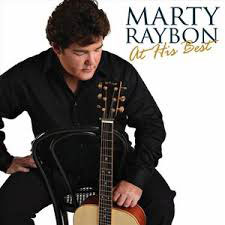
And during your singing career, you became an ordained minister.
I never pursued being ordained. I love the Lord and serve him. At one point I was asked: “Can you do our wedding?” I couldn’t sign the papers not having been ordained. I’ve been asked to conduct services and I’ve done revivals on several occasions, births. A pastor asked me if I had been ordained. “No, sir.” “Your church has never ordained you?” “I never pursued it,” I said.”
I think of myself as a man of God who has been called. If He has me on a mission He’ll use me to do it. I can’t heal people. I can only ask in prayer for God to do that. I’m just a vessel to get someone to a certain place, that’s my only role. I have failed miserably sometimes, but I know good and I never try and push myself onto others. I always let the Spirit lead me. I want to be intimate everyday with God.
Shenandoah in the 1980s
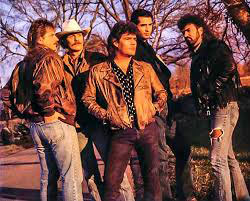
Some days I come across someone who doesn’t understand what they’re going through. So we chat together, and I try and help them understand and the more they talk, I realize maybe there’s an illness or a distraction or it’s a search for the Lord in themselves, but they don’t know how to find their way. Which way is the right way to go? Simplicity is alway the best thing.
If times may be bleak, or health-wise things may be bleak, I may ask: Why does God do that? I think it’s for us to come closer to Him, so that still small voice can reveal itself, telling us: “You’ll be okay.” It’s a thing that can be proven by faith. We can do a lot of things through faith, and find peace through that assurance, and that’s what I try and walk in.
You also reach out and support World Missions and Christian based outreach programs in the task of sponsoring a church building program in Costa Rica.
We built a church and funded it through a wonderful ministry— International Cooperation Ministry, that has been building churches all over the globe.
Shenandoah on tour in 2017
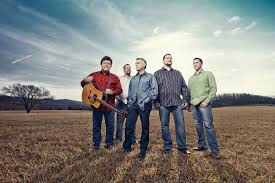
A couple of years before, my wife and I went down there to a property where four pastors had gathered; we literally walked across it. There were twenty-five of us who had gone there, and we prayed to allow those people to have a church to pray in. Down the slope was the city of Coronado. It’s a desperate situation in Costa Rica. Some mothers and fathers will give up their daughters to prostitution so their family can eat and survive.
I believe there’s a choice and a consequence. I looked at those four pastors, and I looked down the slope, and we finally settled on the best place to build that church to help the community. They wanted that church to be a “shining light on the hill.”
Before we got on the van to go back I turned and looked at those four pastors, I saw them bitterly weeping. It was for something else other than crying. The reason was they understood Coronado better than we did. They had seen the hurt and torment families had gone through and that this could be a means through God to help fix some of the problems. That life could change and people in the community could see life could be different instead of what they had been forced into.
Its up to us to visualize what should be. I don’t know if I ever looked for a legacy; I never studied it. But for me, it goes back to preference, about whats important. I told my wife I’d want on my tombstone: “Welcome! My good and faithful servant.” My name can be there under it. For me, that’s what it’s really about.
This music business has taken me a long way, across some wonderful paths, to see some wonderful things I didn’t think I would have ever been able to see. I’ve been very fortunate to achieve the success I have. I think it was ordained of God.
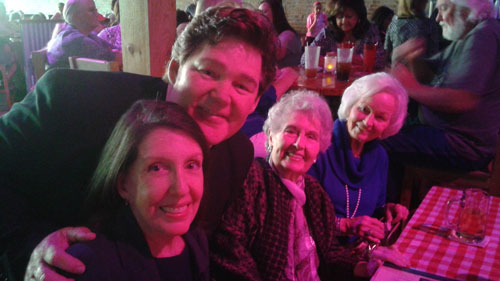
Marty Raybon with Martha Carpenter, Jane Carpenter & Grazia Milsted at Flobama,
Florence, Alabama
We may start out a certain point with what we’re doing but it’s about what we’ve done with the platform we started with. We may not realize we’ve been given a “commission” with the trade we’ve learned or what we learned in school.
At the end of it all, it’s the affect we have on others. When Merle Haggard was in prison, Johnny Cash came to San Quentin and put on the performance for the prisoners. When he saw Johnny Cash play, he said to himself: “That’s what I want to do.” Without a shadow of a doubt, he was supposed to be an entertainer.
I don’t go around judging people. I may get disappointed but I believe I have to decide which “hill I’m going to climb.” It’s what you’re willing to give, what you can share that can literally change lives.•
“Listen to that voice inside that helps you. Be very careful, don't let the source get dried up. Only your deep need to salvage something from the void – to act, to write, to create, not to have a “profession” – can keep you from the commonplace and from dying out. But you must have a deep recognition of your solitude to live the way you should live, not the way it is agreed upon, and not to fall for this big thing around you. Being in the theater means learning about yourself. You have to dump the insignificant in enrich yourself with its truths.” - Stella Adler








































